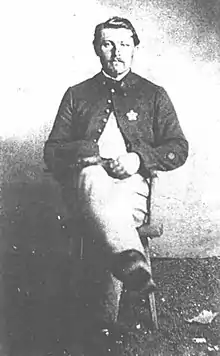Philip Goettel | |
|---|---|
 Goettel c. 1865 | |
| Born | September 2, 1840 Syracuse, New York |
| Died | January 30, 1920 (aged 79) |
| Buried | Woodlawn Cemetery, Syracuse, New York |
| Allegiance | United States |
| Service/ | United States Army |
| Rank | Private |
| Unit | Company B, 149th New York Volunteer Infantry Regiment |
| Battles/wars | American Civil War |
| Awards | Medal of Honor |
Philip Goettel (September 2, 1840 – January 30, 1920) was a Union Army soldier in the American Civil War who received the U.S. military's highest decoration, the Medal of Honor.[1]
Goettel was born in Syracuse, where he entered service. He was awarded the Medal of Honor, for extraordinary heroism shown in Lookout Mountain, Tennessee, when he captured a flag and battery guidon while serving as a Private with the Company B of the 149th New York Infantry on November 24, 1863. His Medal of Honor was issued on June 28, 1865.[2]
Goettel died in his native Syracuse on January 30, 1920, and was buried at Syracuse's Woodlawn Cemetery.
Medal of Honor citation
The President of the United States of America, in the name of Congress, takes pleasure in presenting the Medal of Honor to Private Philip Goettel, United States Army, for extraordinary heroism on 24 November 1863, while serving with Company B, 149th New York Infantry, in action at Lookout Mountain, Tennessee, for capture of flag and battery guidon.[3]
References
- ↑ "Medal of Honor Recipients". United States Army Center of Military History. Retrieved 11 September 2014.
- ↑ "GOETTEL, PHILIP". Congressional Medal of Honor Society. Retrieved 11 September 2014.
- ↑ "Valor awards for Philip Goettel". Military Times, Hall of Valor. Retrieved 11 September 2014.
External links
- Philip Goettel grave at Woodlawn Cemetery (Syracuse, New York)
- "Philip Goettel". Claim to Fame: Medal of Honor recipients. Find a Grave. Retrieved 11 September 2014.
- An essay on Goettel's life and his medal at Gettysburg College
 This article incorporates public domain material from websites or documents of the United States Army Center of Military History.
This article incorporates public domain material from websites or documents of the United States Army Center of Military History.